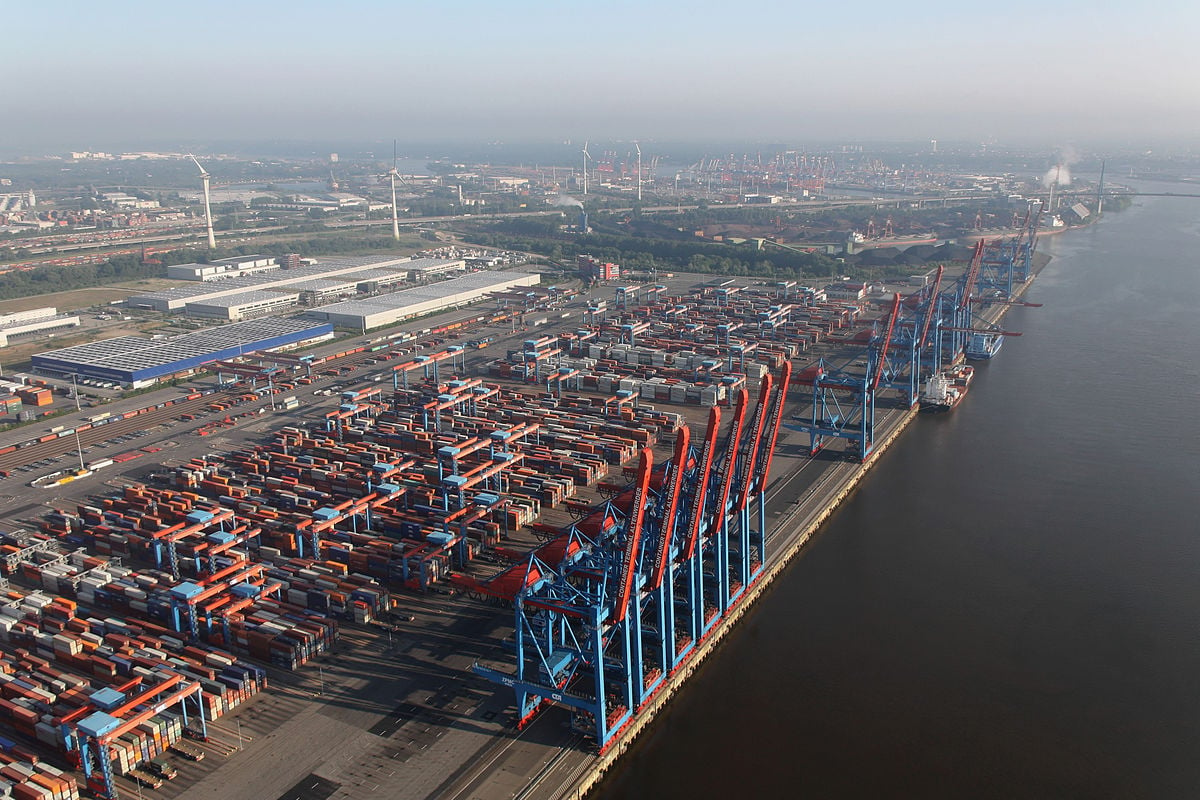Plans by China Communications Construction Company (CCCC) to develop a new container port area in Hamburg are causing political controversy in Germany, adding to the tense trade situation between the two countries.
The City of Hamburg (itself a German Federal State) has built up close relationships with China in recent years, including sea routes and regular freight trains running to cities such as Chongqing in Sichuan Province. It likes to present itself as an important hub of the New Silk Road. Nonetheless the CCCC plans are upsetting local terminal operators and coming under fire from politicians.
 Image: Port of Hamburg. Credit Dirtsc/Wikipedia
Image: Port of Hamburg. Credit Dirtsc/Wikipedia
In January, the Hamburg Port Authority (HPA) addressed the future of the port area Steinwerder-Sud with an internationally advertised “ideas competition”. The vacant docklands area lies to the south of the River Elbe, though is close to the Hamburg city centre, which is on the north bank.
The HPA said that it was planning to develop the 42 hectare-sized area in a future-oriented way, and had already worked out possible site and usage ideas based on a first feasibility analysis. The five-month ideas competition was designed to secure a modern development of the area in line with market requirements. In addition to the basic feasibility, the HPA asked for statements on costs, timing and funding. The HPA would then assess the submitted concepts with regard to the strategic development of the overall Steinwerder area, and integrate the result into the comprehensive port planning.
Local press reports say that HPA has decided to go with the idea submitted by CCCC, including 1,100 metres of quay wall with three berths for ultra large container vessels. The decision has sparked a fierce backlash, with demands for an open tender process and a local solution. Free Democrat (FDP) politician Michael Kruse said that the news had shaken the local shipping industry, and that terminal operators HHLA and Eurogate would be worried about the competition from China. He demanded a fast and clear decision on a contract tender, and said that the so-called ideas competition had in itself led to delays on proper planning.
Olaf Merk, administrator ports and shipping, International Transport Forum at the Organization for Economic Cooperation and Development (OECD), who prepares many reports for the OECD, commented in a tweet on July 18, “China will get a container terminal in Hamburg? When will German operators get a majority stake in a terminal in China?”
CCCC is engaged globally in constructing transport infrastructure, including ports, roads, railways, bridges and tunnels. CCCC is the major shareholder of the global leader in manufacturing large container cranes, Shanghai Zhenhua Heavy Industries.
This high-profile controversy in Hamburg comes at a time when the activities of Chinese companies are under close scrutiny in Germany. In mid-July, the German government announced a new set of measure to tighten its control over foreign corporate takeovers. The government will be able to block takeovers if there is a risk of critical technology being lost abroad, or if critical infrastructure is involved, such as power grids.
The move has been triggered by a series of takeovers by Chinese companies, including in high-tech areas such as robotics and biotech. The measures will take effect shortly with no need for Parliamentary approval.
“Recent years have seen a substantial increase in the number and complexity of corporate acquisitions,” says Brigitte Zypries, minister for economic affairs and energy. “The instruments we have available to review them need to respond to this. For this reason, we have widened the scope of sector-specific scrutiny and included certain types of critical infrastructure. We continue to be one of the world’s most open economies, but we want to make sure that competition is fair. We owe that to our companies. Many of them are facing competition from countries whose economic system is not as open as ours. In future, reporting requirements and adequate scrutiny periods will deliver better protection and greater reciprocity for companies with critical infrastructure.”
A Chinese Foreign Ministry spokesman expressed concern about the move by Germany. Meanwhile the Eurozone banking supervisor known as the Single Supervisory Mechanism is conducting a review of equity investments in Deutsche Bank, Germany’s biggest bank. Hainan Province-based HNA Group and the Qatari Royal Family each own just under 10% of Deutsche, below the formal trigger point for an investigation. But the Single Supervisory Mechanism has powers to conduct a special assessment review to see if any significant influence is being exerted on the bank by major shareholders.









